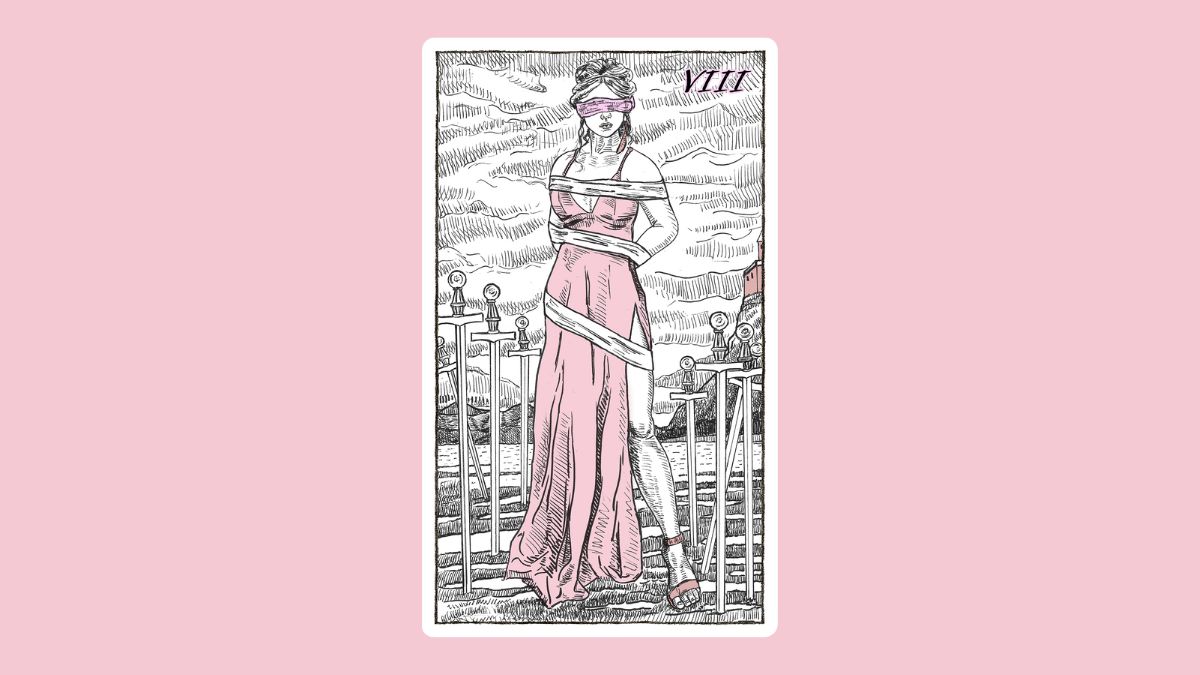The Eight of Swords stands as a potent emblem in the tarot deck, often associated with feelings of restriction and entrapment. When this card appears, it poses a thought-provoking question: Are your limitations self-imposed, or are they influenced by external factors? This card invites introspection and challenges the seeker to consider the narratives that bind them.
Within the imagery of the Eight of Swords, a woman is depicted blindfolded and bound, surrounded by eight swords thrust into the ground. This striking visual serves as a metaphor for the cognitive dissonance experienced when individuals feel confined by their circumstances yet fail to recognize the freedom available to them. Each sword signifies barriers—be they mental, emotional, or situational—that obstruct the path to clarity and liberation.
As the narrative unfolds, it is integral to acknowledge the overarching theme of perception inherent in the Eight of Swords. The blindfold symbolizes an inability or unwillingness to see one’s choices. The individual is ensnared not necessarily by tangible restraints, but rather by self-limiting beliefs and fears. These psychological chains can feel as unyielding as physical bonds, yet they often originate from within.
When interpreting the Eight of Swords, one must delve into the nuances of personal accountability. Why do we cling to fears rooted in insecurity? What lessons are obscured by our unwillingness to confront these demons? The card invites an exploration of these questions, as it underscores the dual role of external circumstances and internal dialogue in shaping our lived experience.
Moreover, a closer examination reveals that the Eight of Swords is intrinsically linked to the themes of victimhood and empowerment. While it may seem easy to adopt a victim mentality, recognizing one’s agency is a critical pivot point for transformation. The card challenges seekers to confront the reality that every choice carries power—the power to act or to remain passive.
The notion of empowerment can be further examined through the lens of resilience. The Eight of Swords encourages individuals to reflect upon situations where they have felt powerless in the past, only to later realize they had the capacity to shift their circumstances. How can these lessons inform the present? The path to overcoming adversity often lies hidden within prior experiences, urging us to reassess how we define our limitations.
As individuals grapple with the implications of the Eight of Swords, the concept of perspective becomes paramount. This card embodies the idea that once the blindfold is lifted, the situation may be far less dire than initially perceived. Facing discomfort can be a catalyst for growth. This, however, requires a willingness to confront fears head-on, rather than shying away from them.
It is also essential to reflect upon the element of support or the lack thereof within the landscape of the Eight of Swords. Relationships, whether entwined with obligation or support, have the capacity to either encumber or liberate us. It prompts a critical assessment: Are there individuals in your life who inadvertently perpetuate your sense of confinement? Are there allies who encourage growth and exploration? Discerning these influences is vital in reclaiming one’s narrative.
On another note, the Eight of Swords serves as a poignant reminder of the transient nature of challenges. Just as clouds can obscure the sun, obstacles can seem formidable in the moment. Nevertheless, the potential for change always exists. As the metaphorical swords stand rigid, it is worth asking: What strategies can be employed to dismantle these barriers? Approaches such as mindfulness, counseling, or simply seeking new perspectives may provide the clarity needed to transcend a daunting situation.
Moreover, the card emphasizes the importance of self-reflection. What habitual thought patterns contribute to your entrapment? By taking stock of one’s mental landscape, individuals may unearth affirmations that counteract fears. Embracing empowerment entails selecting thoughts that propel one forward rather than those that tether them backward.
In the broader context, the Eight of Swords can not only speak to individual experiences but also reflect collective societal patterns. It may symbolize a community feeling oppressed by unjust systems—be they cultural, economic, or political. The call to action here is both personal and communal: what role does societal perception play in perpetuating feelings of entrapment? In this light, embracing dialogue, activism, and community engagement becomes vital in challenging the status quo.
Ultimately, the Eight of Swords serves as both a cautionary tale and a beacon of hope. While it elucidates the nature of restrictions—be they self-imposed or otherwise—it also underscores the liberating power of awareness. The very act of acknowledging one’s bondage can act as the first step towards emancipation.
In conclusion, the Eight of Swords invites reflection, reassessment, and renewal. By posing challenging questions and urging individuals to face their fears, the card compels us to explore the boundaries of our mental and emotional landscapes. In doing so, it opens the door to newfound freedom and resilience. What steps can you take today to lift the blindfold and free yourself from your own restraints? The journey toward liberation begins with the acceptance of one’s potency to change.







Leave a Comment